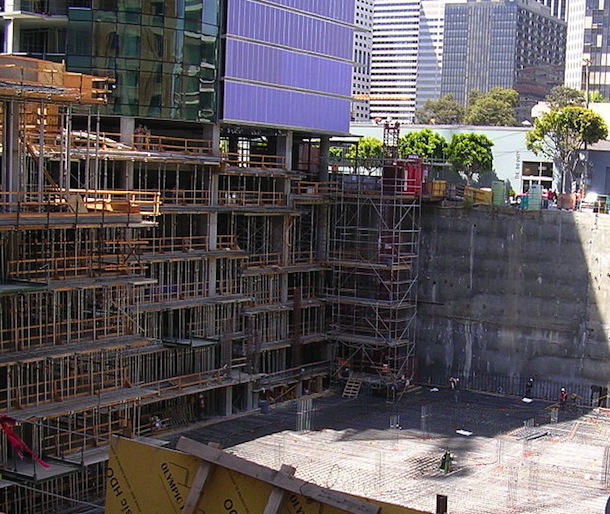Engineering and construction CEOs are more optimistic this year than in previous years, according to PwC’s 2014 Global CEO Survey. Forty-one percent of respondents expect to grow over the next 12 months, up from 31% last year.
This and other big-picture facts are available in the survey, which provides multiple “snapshots” of the engineering and construction sectors, including growth markets, government impact on the industry, transformative global trends, and concerns about sustainability and climate trends.
Here are some of the snapshots we found the most interesting (read the full report):
- 50% of CEOs in the engineering and construction sector believe the global economy will improve over the next 12 months; 9% believe it will decline
- 78% of sector CEOs are concerned about how governments will respond to deficit and debt in the next year—this is the concern that the highest number of engineering and construction CEOs reported worrying about
- 76% of sector CEOs are worried about high and volatile raw material prices
- Concerns about infrastructure gaps are a consistent concern—47% of sector CEOs reported concerns that inadequacy of infrastructure could hurt growth, 50% think that infrastructure think it should be one of their government’s top 3 priorities, and 41% feel that the government is ineffective (as opposed to 33% who believe that the government is effective)
- The U.S. topped the list of growth markets, and the Middle East ranked much higher as growth markets for engineering and construction CEOs than for other sectors
- Cost reduction heads the list of restructuring activities
- 69% of sector CEOs believe that technological advances such as the digital economy, Big Data, and social media will be the biggest transformative trend for their businesses in the next year
- E&C CEOs are significantly more worried about the availability of key skills in their workforces than are other industries.
- 89% of E&C CEOs say it’s important for their company to try and reduce their environmental footprint.
- 59% of E&C CEOs believe that resource scarcity and climate change will transform their business
For more, read the full report.
Related Stories
| Mar 9, 2011
Hoping to win over a community, Facebook scraps its fortress architecture
Facebook is moving from its tony Palo Alto, Calif., locale to blue-collar Belle Haven, and the social network want to woo residents with community-oriented design.
| Mar 9, 2011
Winners of the 2011 eVolo Skyscraper Competition
Winners of the eVolo 2011 Skyscraper Competition include a high-rise recycling center in New Delhi, India, a dome-like horizontal skyscraper in France that harvests solar energy and collects rainwater, and the Hoover Dam reimagined as an inhabitable skyscraper.
| Mar 9, 2011
Igor Krnajski, SVP with Denihan Hospitality Group, on hotel construction and understanding the industry
Igor Krnajski, SVP for Design and Construction with Denihan Hospitality Group, New York, N.Y., on the state of hotel construction, understanding the hotel operators’ mindset, and where the work is.
| Mar 3, 2011
HDR acquires healthcare design-build firm Cooper Medical
HDR, a global architecture, engineering and consulting firm, acquired Cooper Medical, a firm providing integrated design and construction services for healthcare facilities throughout the U.S. The new alliance, HDR Cooper Medical, will provide a full service design and construction delivery model to healthcare clients.
| Mar 2, 2011
Design professionals grow leery of green promises
Legal claims over sustainability promises vs. performance of certified green buildings are beginning to mount—and so are warnings to A/E/P and environmental consulting firms, according to a ZweigWhite report.
| Mar 2, 2011
Cities of the sky
According to The Wall Street Journal, the Silk Road of the future—from Dubai to Chongqing to Honduras—is taking shape in urban developments based on airport hubs. Welcome to the world of the 'aerotropolis.'
| Mar 2, 2011
How skyscrapers can save the city
Besides making cities more affordable and architecturally interesting, tall buildings are greener than sprawl, and they foster social capital and creativity. Yet some urban planners and preservationists seem to have a misplaced fear of heights that yields damaging restrictions on how tall a building can be. From New York to Paris to Mumbai, there’s a powerful case for building up, not out.
| Mar 1, 2011
Smart cities: getting greener and making money doing it
The Global Green Cities of the 21st Century conference in San Francisco is filled with mayors, architects, academics, consultants, and financial types all struggling to understand the process of building smarter, greener cities on a scale that's practically unimaginable—and make money doing it.
| Mar 1, 2011
How to make rentals more attractive as the American dream evolves, adapts
Roger K. Lewis, architect and professor emeritus of architecture at the University of Maryland, writes in the Washington Post about the rising market demand for rental housing and how Building Teams can make these properties a desirable choice for consumer, not just an economically prudent and necessary one.
| Mar 1, 2011
New survey shows shifts in hospital construction projects
America’s hospitals and health systems are focusing more on renovation or expansion than new construction, according to a new survey conducted by Health Facilities Management magazine and the American Society for Healthcare Engineering (ASHE). In fact, renovation or expansion accounted for 73% of construction projects at hospitals responding to the survey.












